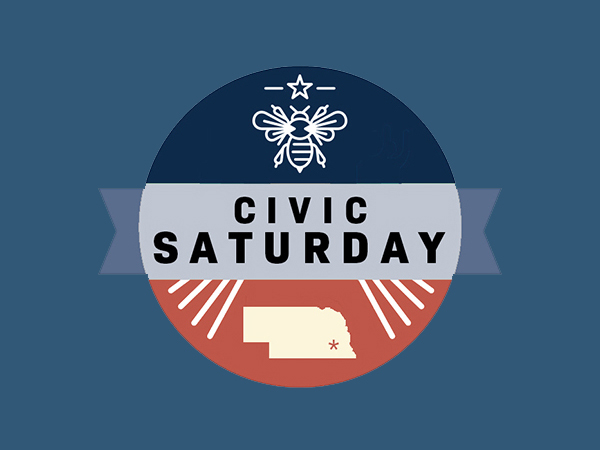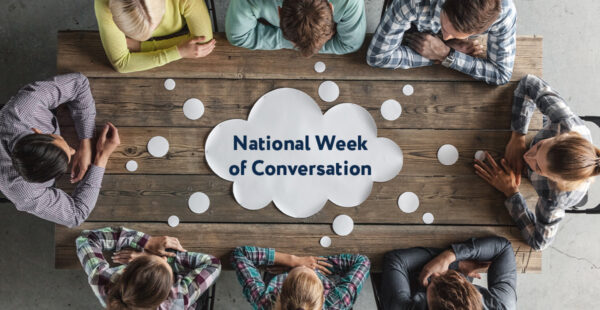On Saturday, July 1, Civic Nebraska convened Civic Saturday, a gathering of friends and strangers to recommit to our founding creed and to celebrate our collective role in creating a more perfect union. Steve Smith, a national Civic Saturday fellow from Lincoln, delivered the following civic sermon to those in attendance. For full audio of the gathering, click here. For previous Civic Saturdays, click here.

Welcome, everyone. I’m so glad to be here with you today. Thank you for coming. If you don’t mind, I’d like to start our gathering with a question: What is your favorite sport? Don’t be shy, yell it out!
(The audience responds: Soccer! Cycling! Basketball!)
Excellent. Some good ones in there.
Right now, I find myself mostly into cycling, baseball, and soccer. I love the Tour de France. I can’t wait for the Women’s World Cup this month. Mainly because it’ll take my mind off of yet another miserable season for the Kansas City Royals. So yeah, for me, it’s cycling, baseball, and soccer.
What, am I forgetting something? Something Big and Red?
(Laughter from the audience)
I don’t mention Husker football because that kind of goes without saying, doesn’t it? I mean, if you’re a Nebraskan you know that Husker football is not just the biggest sport in our state, it’s the biggest thing in our state. In 2005, I wrote a memoir about growing up as an obsessive Husker football fan. The book has now been through three printings. I’d like to think its success comes from my wit and insight – but I’ll concede that if you put a red “N” on something in the Cornhusker State, it’s going to sell no matter what.
Back to that year of 2005. You know, in November of that year, our Huskers went on the road to play Colorado, their dreaded rivals. Now, the Buffaloes had just clinched their fourth Big 12 North Division title in five years. But on this day, the Big Red ran all over them and won 30-3. At the end of the game, Husker players saluted the brave Nebraskans who came to Colorado’s Folsom Field by pulling up their game jerseys to show a t-shirt with a message on them. Does anyone remember what those t-shirts said?
(An audience member responds: RESTORE THE ORDER!)
Yeah, exactly! Restore The Order. It was in reference to Nebraska’s plan to return to the top of the Big 12, just as God and Tom Osborne intended. Restore the Order. That came back to me recently, after I saw an LSU baseball fan in Omaha last week, wearing a purple and yellow version of the same shirt. Apparently, that phrase can travel. And, naturally, I have some thoughts. Buckle up.
I’d say that writ large, Restore The Order is a good way to describe a key part of America’s relationship with sports – especially in this current era of disruption and strife. It’s clear our nation is going through some growing pains, not unlike an adolescent. When I was in my teens, I often used sports to understand and navigate the messiness of my world. I wished that the clear-cut nature of the games that I loved applied to other parts of my life. On the field of play, there’s not a lot of gray area. The ball either lands in fair or foul territory. You either win, or you lose (or if we’re talking soccer, there’s that unfortunate third option). The point is, outside the lines, life was often puzzling and muddled and awkward, and full of conflicts that didn’t always have clear resolutions. But not inside the stadium.
That’s one reason why I, along with millions of Americans, consider myself an avid sports fan.
You might be sitting there thinking, Good for you, but that’s not me. That’s cool – I promise no one is going to try to convert you today into a sportsball fan if you don’t want to be. But love them or hate them, sports are a defining obsession in America. It’s where, in a fragmented media landscape, the remains of consensus American culture exists. What are the two events that still bring blue-collar workers, homemakers, and CEOs together? The Super Bowl and March Madness. Like I said, love sports or hate them, but you can’t escape them.
This might sound awful to those of us who really don’t care about when Aaron Judge comes off the disabled list or if the Denver Nuggets are the NBA’s dynasty of the 2020s. It’s probably healthy to harbor skepticism about the big business that competitive athletics has become in America.
It’s hard for any of us born after World War II, before the rise of mass media and mass culture, to understand the true roots of our American games. But – would you believe this? As we developed our sports here on this continent, they weren’t necessarily to relentlessly pursue victory. In truth, when competitive athletics emerged in America in the 19th century, it was to promote civic virtue and good citizenship.
It’s true. It’s true. As we start our long holiday weekend, let’s take a look at this tradition – this virtue that is built into our games.
Then, let’s look at things in modern times, and what our sports have evolved into.
And finally, let’s consider what it might take to – well, to restore the order.
Let’s briefly examine the rise of organized sports in America.
The established order, so to speak.
If we could point a time machine back to the 19th century, we would not see millions of young Americans playing soccer, basketball, softball, or what have you. There was no Little League World Series – or a Major League World Series, either. And there certainly weren’t these elite youth travel squads racking up wins as they travel from tournament to tournament.
What would we see? Predominantly, lower-class children running, throwing, catching, and kicking some ball or another, all in competition with other lower-class children. Athletic competitions tended to be the domain of our poorest Americans, many of who were recent arrivals and who were clustered in our cities.
At the same time, there was a push for mandatory schooling in the United States. And, compulsory education changed millions of young Americans’ lives, not to mention their daily routines. Most significantly, it created something called leisure time.
But what should young Americans do with this so-called leisure time? One answer was, yes, competitive sports.
This worked well on at least two levels. Through the art of play, we could teach the American virtues of teamwork, perseverance, fairness, respect for the rules, and – importantly – equal treatment of everyone. Plus, exercising built strength and dexterity, which was needed in a rapidly industrializing America.
Show of hands – who knows how James Naismith was? Right. The inventor of basketball, in 1891. He also was the perfect P.E. teacher for his time – he believed in his heart of hearts that the characteristics of a good citizen were also the characteristics of a good teammate. I’m sure Naismith would be glad to know the Kansas Jayhawks are still a basketball powerhouse. But he’d also be interested to see if his sport was still useful in developing a sense of civic virtue in those who played it. Because above all, he considered basketball as a form of moral training in our liberal democracy.
So. Given our games’ civic foundation, should we really be surprised that they evolved into something more – something close to our hearts, something akin to a social movement for those who followed them? We Nebraskans are a great example of this. We’re not just devotees of a team or a game. We’re “Husker Nation.” Of course, this nation isn’t defined by any territory, but by our own unique values.
That phrase is relatively new, but the idea behind it isn’t: One hundred years ago, the university carved a phrase by local philosopher Hartley Burr Alexander into the side of the brand-new Memorial Stadium. It was tone-perfect for America’s approach to sports at the time.
Courage, generosity, fairness, honor. In these are the true awards of manly sports.
You can still find those words at Memorial Stadium today. They just might not land quite the same as they did back in 1923.
Now let’s move forward in time, to today.
I want to believe that good citizenship is still foundational to sports. But I do fear that it’s much more difficult to find that original signal amid all of the current noise. And friends, there is a lot of noise. At last estimate – don’t quote me on this – there are about 20 local journalists who cover Husker football on a daily basis. A daily basis. Meanwhile, you can count the number of government reporters in Nebraska on one hand.
Yet, some days, you can barely tell the coverage apart. Is this sports or politics, politics or sports? I mean, sports has always been political, owing to their class-based, communal origins. Our politics, on the other hand, have now taken on a sporting veneer – we so easily identify with our teams that we automatically snap into the same framework when it comes to our political and civic lives.
Again, it makes sense, in the context of our times. If our sports started mainly as a way to build civic virtue during an era of growth, expansion, and optimism in America, then sports also now reflect our modern society’s disconnectedness, anxiety, aggression, and conflict. There are millions upon millions of Americans who are, to put it mildly, uneasy with what they see happening around them. I can’t blame them for wishing, like I once did, that the messiness of America could be brought to order, under the rules of the same game.
So in a nation of spectators, our civic life has become in many ways another game to follow on behalf of our respective teams. And of course, our appetite for spectacle has very little tolerance for something as unexciting as civic virtue. Cooperation and fair play aren’t big ratings draws. The darker aspects of America’s sports culture have bled into our shared public life: Winning is everything. Vulnerability is for losers. Ultimate triumph requires aggressiveness at all times. Mercy is for the weak.
Look, I know that our politics have never been for the meek. But through the decades, they have tended to adhere to a set of useful and moderating norms. But now, it’s not just enough to win. Your opponent must also lose, and lose badly and humiliatingly.
All of this tends to provoke one of two reactions among us average Americans. The first is to dive into the conversation in the winners-and-losers mode that powers our sports fandom. The other option – which is just as popular – is to check out entirely, to refuse to play the game. Refuse to even acknowledge the game.
The first reaction is bad for the country. We all saw that a couple of Januarys ago. But the second one – withdrawing from public life – is surely lethal. Because contrary to how we see our lives framed on the news, this is no game.
So what can we do? What should we do?
Honestly, if it was easy, we wouldn’t be talking about it today. The forces that now anoint winners and losers in housing, education, the economy, and even our civil rights – are entrenched. They are powerful. Each of those issues, plus a dozen more, is complex and overwhelming. So let’s start by doing what any good coach or athlete does when things go south.
Let’s get back to basics. Let’s focus on the fundamentals. And most of all, let’s remember who we are.
America, our bastion of rugged individualism, wouldn’t exist without some amazing teamwork back in the day. Of course, we know the major players of the Founding – guys like Washington and Jefferson and Franklin and Adams. We often revere them as individuals, but the Founders had a deep understanding of how to work together to create something that had never been done before.
The era required it. Washington was the team captain. Jefferson was the spokesman. Adams was one heck of a utility infielder. And Ben Franklin was the wise, veteran presence in the locker room.
Without any one of these people, the world as we now know it would look very different. They added their individual gifts to their team because they knew that the situation called for unity, for everyone to set aside minor differences in pursuit of a singular goal.
How did Franklin put it? We must all hang together or, most assuredly, we shall all hang separately.
Don’t misunderstand this as a call to just go along to get along. Yes, the Founders were good teammates. That also meant holding one another accountable, and challenging each other repeatedly as American democracy emerged. Today, I’ve presented conflict in mostly a negative light, but we know that harmony and progress are not necessarily the same thing. Great leaps forward often are powered by incredibly talented people who get in a room and crash up against each other.
To play the American game in a style that honors the Founders, we can and should lean into our diversity as a strength.
Second, let’s keep our common goal in mind. We’re obviously moving through a time when our politics are being weaponized to punish others. It’s happening in the halls of the U.S. Capitol as well as the Nebraska State Capitol, not to mention state capitals around the country.
Yet, our country’s fundamental goals are easy enough to understand. You just have to read past the first three words of the Preamble.
To form a more perfect Union.
To establish justice.
To insure domestic tranquility.
To provide for the common defense.
To promote the general welfare.
And to secure the blessings of liberty.
Nations do not take shape without a purpose. It’s America’s purpose to be a great vehicle and example of equality and human progress.
In that sense, we should also be prepared to coach one another up. It’s at these times, in particular, when it’s essential for us to keep our eyes on the ball – and to be loud and proud about this nation’s great purpose.
That’s essential in today’s America because, as you’ve heard me say so many times before, democracy works only if enough of us believe democracy works.
So, again: Be good teammates. Keep driving toward our shared goal. And coach each other up when needed. If we commit to these American traditions – truly commit to them – then we’ll do our part in fulfilling our nation’s destiny as this planet’s last, best hope.
These traditions remind us of where we started, where we are today, and where we can still go as a people. And they offer us a clear path forward to ensure the blessings of liberty, for ourselves and our posterity.
Put another way, they can – yes, they can help us restore the order.
You know that saying from Hartley Burr Alexander I mentioned earlier, the one written on Memorial Stadium? It’s just one of four such phrases that are carved onto the face of our state’s most beloved venue.
One of them stands out above the other three. You see the phrase everywhere in Husker Nation, and it stands as a reminder that true virtue isn’t measured by wins and losses. It also sums up, quite nicely, each of our responsibilities in this, our shared democratic reality. And it goes:
Not the victory but the action;
Not the goal but the game;
In the deed the glory.
Thank you for giving me the honor of sharing with you today.





